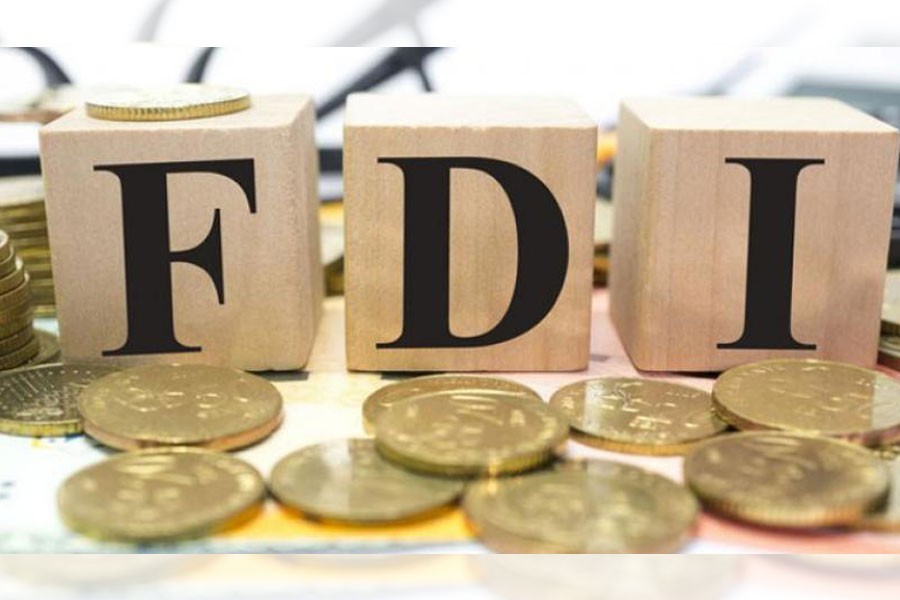After the two consecutive years of decline in the inflows of foreign direct investment (FDI) in Bangladesh, the recovery is likely to take more time.
World Investment Report (WIR) 2021, released by the United Nations Conference on Trade and Development (UNCTAD) today (Monday) morning from Geneva makes the prediction.
It showed that inflow of FDI in Bangladesh dropped by around 11.0 per cent in 2020 to US$2.56 billion from $2.87 billion in 2019. The net inflow of FDI in 2018 was $3.61 billion which was the highest amount of inflow in a single year in the country.
The report also mentioned that global FDI declined by 35 per cent to $998.91 billion in the last year from $1530.28 billion (or $1.53 trillion) in 2019 due to pandemic.
It, however, expressed optimism that FDI flows are expected to bottom out in 2021 and recover some lost ground with an increase of 10 to 15 per cent in the current year.
“In Bangladesh and Sri Lanka, FDI inflows will take longer to recover, as investment commitments in these countries remained weak,” said the UNCTAD report.
In this connection, it mentioned that announced greenfield investment projects in 2020, an indication of FDI trends over the next few years, contracted 87 per cent in Bangladesh and 96 per cent in Sri Lanka.
“This contraction is due to weak investment interests in garment production, a major export industry and FDI recipient in these countries,” it added. “Investment in, and production of, garments suffered severely in 2020, with no sign of recovery as of early 2021.”
The report also mentioned that garment factories in Bangladesh faced some $3 billion worth of cancelled export orders in the last year while in Sri Lanka, export data for January 2021 showed no recovery yet.
Bangladesh was the second largest recipient of FDI in the last year among the Least Developed Countries (LDCs), preceded by Cambodia where inflow of FDI stood at $3.60 billion in 2020. Ethiopia became the third with $2.40 billion and followed by Mozambique ($2.30 billion) and Myanmar ($1.80 billion). All the five LDCs faced decline in FDI in the last year.
“As in previous years, inflows were concentrated in some large LDCs,” said the UNCTAD report.
“The top five recipients (Cambodia, Bangladesh, Ethiopia, Mozambique and Myanmar, in that order) accounted for more than half of FDI to the group, and the top 10 (adding the Democratic Republic of the Congo, Senegal, the United Republic of Tanzania, Mauritania and the Lao People’s Democratic Republic) for over three quarters,” it added.
WIR 2021 also mentioned that foreign investment inflows in Bangladesh are “shifting away from large non-renewable energy and finance projects towards fintech, the pharmaceutical industry, liquefied natural gas plants and agribusiness, which the Government is actively promoting.”
“The prospects of FDI in LDCs remain subdued in the immediate future. Inflows are expected to remain sluggish over the next few years,” said the report.
“Even though some countries contained the disease effectively and quickly (e.g., Bhutan), in many LDCs mass vaccination may be many years away,” it added.
According to UNCTAD, the immediate challenge is to minimise the number of “lost” years in terms of progress toward SDG goals.
“The main concern in LDCs is that the pandemic could wipe out development gains achieved over the last decade under the Istanbul Programme of Action (2011–2020) and the SDG agenda,” the report continued.
UNCTAD also express apprehension that the six LDCs including Bangladesh in the process of graduation may face more difficulty.
“An additional two years were added to the transition period for those selected for graduation after the outbreak of the pandemic (e.g., for Bangladesh and Nepal, until 2026) suggests that the international community is willing to support LDCs to adjust in a more orderly manner to the changing conditions of the world economy,” it added.


